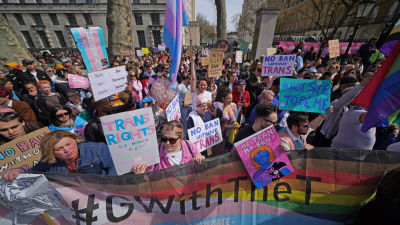Insight
Government pledges watered down ban on ‘conversion therapy’

For the second year running the government has promised a bill to “ban conversion therapy” as part of the Queen’s Speech.
But while Prince Charles repeated the pledge that his mother the Queen read out in parliament last year, its meaning has been significantly diluted.
Earlier this year, ITV News revealed a leaked document detailing how the government was intending to drop its long-promised ban, first outlined by Theresa May in 2018.
After an intense backlash from Conservative MPs, within three hours of the news being broadcast the government quickly performed a partial U-turn.
Buried away on page 128 of the government’s briefing notes on Tuesday's speech are the details of what is now a significantly slimmed down bill.
Firstly, the government states that it intends only to “ban conversion therapy practices intended to change sexual orientation.”
Last month, trans conversion therapy – attempting to change someone’s gender identity – was dropped from the ban, sparking the resignation of one of the government’s LGBT advisors and a widescale boycott of the government’s international LGBT+ conference, which had to be cancelled.
Tuesday's speech makes the exclusion of trans conversion therapy from the ban explicit, but does promise: “Recognising the complexity of issues and need for further careful thought, we will carry out separate work to consider the issue of Transgender Conversion Therapy further.”
Secondly, even conversion therapy relating to sexual orientation will only be banned to a limited extent.
The government makes clear that adults will still be able to consent to the practice.
Their explanation states that the ban “will protect under-18s, regardless of circumstance, and over-18s who do not consent and who are coerced or forced to undergo conversion therapy practices.”
ITV News has spent the past four years investigating conversion therapy and uncovered many practices which would not necessarily be described as ‘coercive’.
For example, in 2018 we exposed practices at Winners Chapel in Kent, where our undercover reporter was told that the devil had made him gay and intense prayer could help him.
It is not clear whether this approach would be deemed as coercive given that our reporter had technically consented to the practice, which campaigners say is still deeply damaging.
An ITV News undercover investigation exposes the UKchurch that claims God can fix gay people
Jayne Ozanne, who has been the lead campaigner on this issue having undergone conversion therapy herself, said "it is of great concern that they [the government] are creating so many loopholes and leaving so many people unprotected."
She added: "The government's own research shows that trans people are twice as likely to be offered 'conversion therapy' and it is an utter disgrace that they have purposefully omitted them from the ban. The government's duty is to protect the most vulnerable from abuse, not to side with the abusers."
"By creating a loophole of consent, the government continues to ignore the advice of legal experts and survivors like myself, who know that this will continue to put many lives at risk."
Outlining its bill, the government recognises that 16 countries have already implemented bans on conversion therapy, some of which go further than the UK is intending to.
A government spokesperson said: “The government has a proud record on LGBT rights, and the government is committed to bringing forward legislation to ban conversion therapy.
“Recognising the complexity of issues and need for further careful thought, we will carry out separate work to consider the issue of transgender conversion therapy further.
“This is a legally complex area and we have a responsibility to ensure unintended consequences are not written into legislation, particularly in the case of under 18s.”
What you need to know - Listen to the latest episode
Several Conservative MPs are continuing to lobby the government to broaden the ban here to include trans people and drop the clause about coercion.
Others in parliament have raised concerns, however, that banning trans conversion therapy might inadvertently prevent healthy discussions about a person’s gender identity.
Some religious leaders such as the Evangelical Alliance have also argued that freedom of religion must be protected in any ban.
All of this will now be the subject of intense debate as the bill is – in theory – presented to parliament sometime within this session.
But four years on since Theresa May first promised on ITV News that the practice would be ended, there is still little sense that a ban is agreed and imminent.